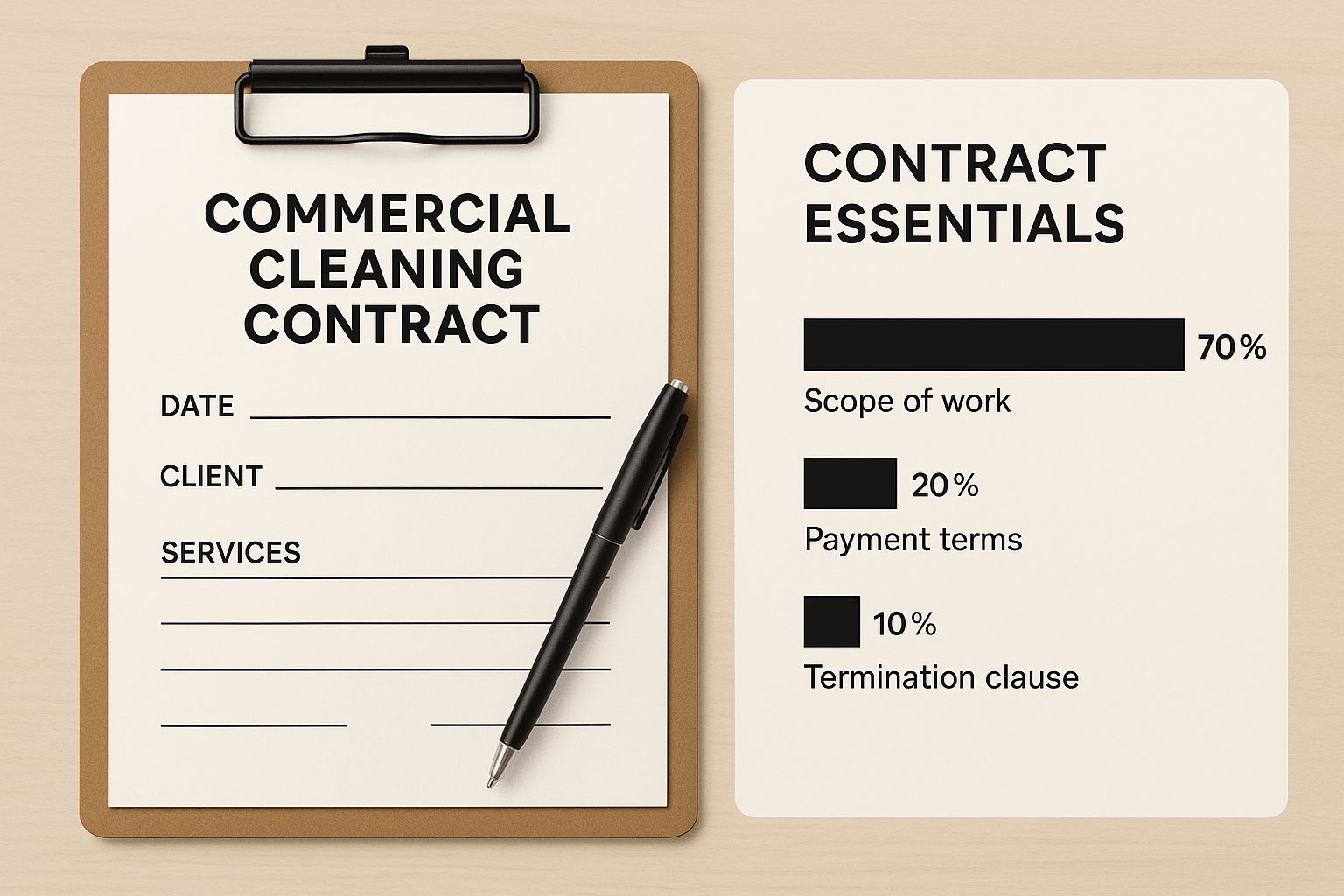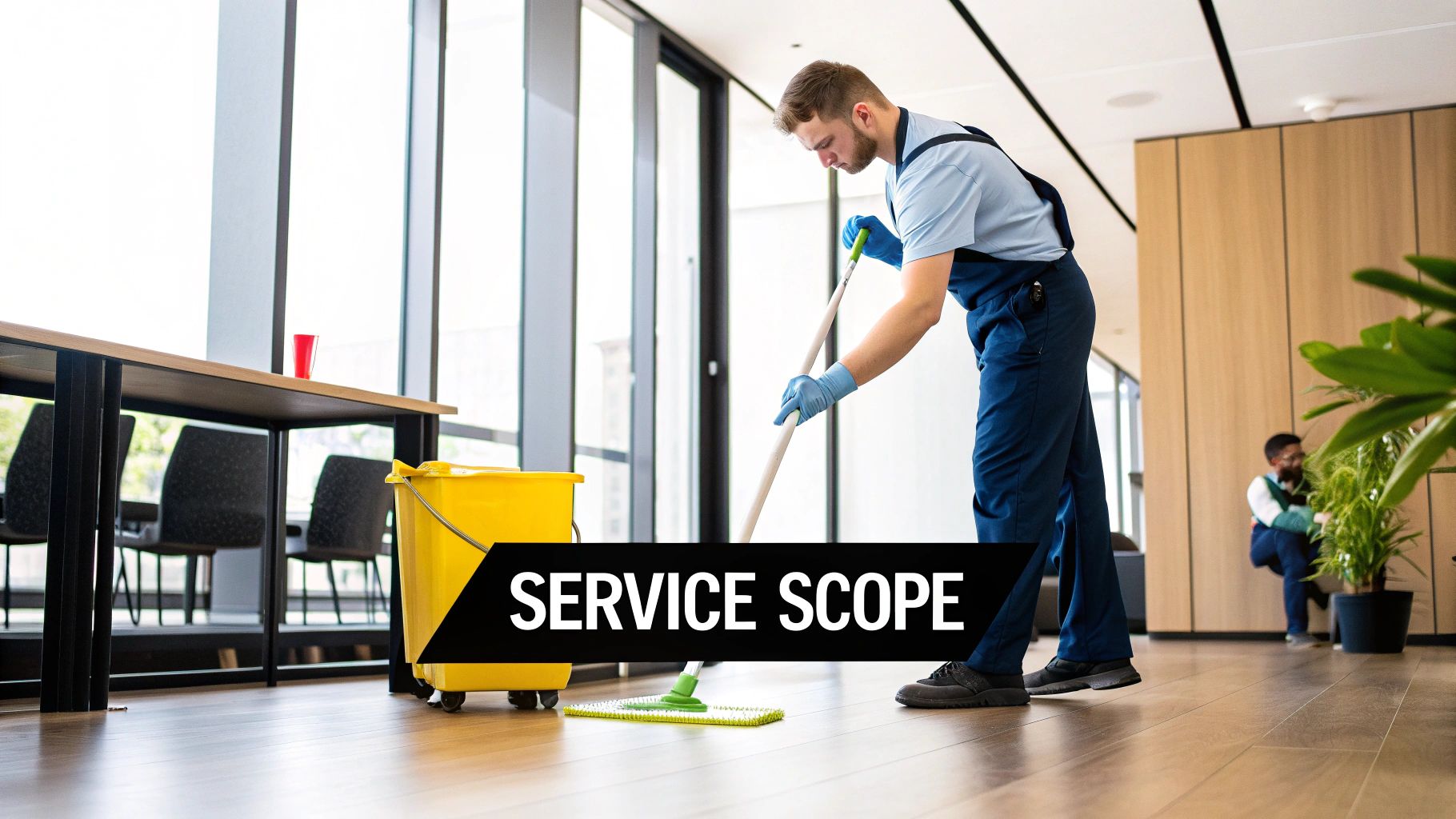A commercial cleaning contract is the formal agreement that lays out exactly what cleaning services a company will provide to a business—what gets cleaned, how often, and for how much. Think of it as the roadmap for your partnership, making sure both you and your cleaning provider are on the same page about keeping your space professional, safe, and hygienic.
Why Your Cleaning Contract Needs to Be Rock-Solid
Don't mistake your commercial cleaning contract for just another piece of paperwork. It's the very foundation of a successful, long-term relationship with your provider. A vague or poorly drafted agreement is a recipe for disaster, leading straight to misunderstandings, missed tasks, and surprise costs down the road.
When a contract is fuzzy, it leaves far too much up for debate, and that can poison a business relationship fast.
For example, what does "clean the floors" actually mean? Is it just a quick vacuum? Does it include mopping? Or are we talking about a deep scrub and wax? Who’s buying the cleaning supplies? Ambiguity creates friction and, almost always, dissatisfaction for everyone involved.
Setting Clear Expectations from Day One
A truly solid contract takes all the guesswork out of the equation. It spells out every single detail of the service, protecting both your business and the cleaning company. This kind of clarity is what ensures you get a consistently high standard of cleanliness—something that directly reflects on your brand and even boosts employee morale.
There are a few areas where you absolutely can't afford to be vague:
- Scope of Work: Get a detailed checklist of all tasks, from daily dusting and emptying bins to monthly window washing.
- Quality Standards: Define what "clean" actually looks like for your specific facility. These should be objective and measurable.
- Communication Protocols: Establish a clear process for how to report an issue or request an extra service. Who do you call? What's the expected response time?
- Liability and Insurance: Outline who is responsible if an accident happens or property gets damaged.
The Growing Importance in a Competitive Market
The need for ironclad agreements is more critical than ever, especially when you look at the size of the industry. In Canada, commercial cleaning is a massive and growing sector, driven by new commercial construction and urbanization. With so many providers competing for your business, a detailed contract is your best guarantee that you're getting the quality you pay for.
The Canadian cleaning services market was valued at about USD 1.42 billion and is expected to climb to around USD 2.06 billion by 2034. You can dig deeper into these numbers by exploring the full report about the cleaning services market in Canada.
Ultimately, putting in the time to create a comprehensive cleaning contract isn't about getting bogged down in red tape. It's about building a reliable, professional relationship that keeps your space looking immaculate.
Building the Core of Your Cleaning Contract
Alright, let's get into the nuts and bolts of your commercial cleaning contract. Think of this as the engine of your agreement—it's where you define the non-negotiable clauses that protect everyone involved and set the stage for a great working relationship. We need to move beyond generic templates and dig into the practical details that make a contract genuinely work.
At its core, a cleaning contract is a service agreement. If you're new to this, it can be helpful to look at a basic contract template for services just to get a feel for the fundamental structure. Then, you can start customizing it for the specific realities of the cleaning world.
Detailing the Scope of Work
This is, without a doubt, the most critical part of your contract. I can't tell you how many disputes I've seen that boil down to a vague Scope of Work (SOW). Ambiguity is your enemy here. You need to spell out exactly what gets cleaned, when it gets cleaned, and how it gets cleaned.
"Clean the office" is a wish, not an instruction. What you need is something like: "Vacuum all carpeted areas, mop all hard floors with an approved neutral-pH cleaner, and empty all waste bins every Monday, Wednesday, and Friday evening after 6:00 PM." See the difference? One leaves everything to chance; the other leaves nothing.
Clarifying Payment Terms and Schedule
Your payment clause should be crystal clear. Pin down the exact cost, whether it’s a flat monthly fee, an hourly rate, or a per-visit charge. This is also where you'll map out the entire invoicing and payment process.
- Invoice Submission: When will you send invoices? Be specific (e.g., the last business day of the month).
- Payment Due Date: How long does the client have to pay? Net 30 days is common, but set what works for your business.
- Late Fees: What happens if they're late? Define the interest rate or flat fee. This isn't about being punitive; it's about respecting your cash flow.
- Payment Methods: What do you accept? (e.g., EFT, cheque, credit card).
Getting this right from the start prevents awkward conversations down the road. It also ensures your business maintains a healthy cash flow, which is absolutely vital for delivering consistent, high-quality service.
Must-Have Clauses in Your Commercial Cleaning Contract
To avoid any confusion, here’s a quick breakdown of the essential clauses and what you absolutely need to specify in each one. Getting these details right is what separates a professional, protective contract from one that’s full of holes.
table block not supported
Having this level of detail might seem like overkill at first, but it’s what gives your agreement strength and clarity, building a foundation of trust with your client from day one.
Establishing Insurance and Liability
Accidents are a fact of life. A mop bucket gets knocked over onto a server rack, or someone slips on a freshly waxed floor. The insurance and liability clause is your financial safety net, making it perfectly clear who is responsible for what when things go wrong.

The cleaning company must provide proof of adequate coverage. You're typically looking for two key things:
- General Liability Insurance: This is for property damage or bodily injury caused by the cleaning team's work.
- Worker's Compensation: This protects their own employees if they get hurt on the job at your location.
Always, always ask for a current Certificate of Insurance (COI) before a single cleaner steps foot on your property. This isn't just bureaucratic red tape; it’s fundamental due diligence that shields your business from massive financial risk.
Outlining Termination Conditions
Finally, every good partnership needs a well-defined exit strategy. The termination clause lays out how and why the contract can be ended by either you or the client.
Typically, this includes a required notice period—like 30 or 60 days—for ending the agreement without cause.
You also need to specify the conditions for immediate termination "for cause." This could include things like a serious breach of contract, consistent failure to meet the agreed-upon cleaning standards, or failure to pay. This clause ensures there's a fair and orderly way to dissolve the relationship if it's just not working out, preventing a messy and unprofessional breakup.
Defining the Scope of Work with Precision

If there's one thing I've learned, it's that a vague Scope of Work (SOW) is the fastest way to a soured relationship with your cleaning provider. It’s the number one cause of friction. When expectations aren't crystal clear from the get-go, disappointment is almost inevitable. This is where you need to get granular, turning broad requests into a detailed, actionable checklist that leaves zero room for misunderstandings.
Think of the SOW as the game plan for your cleaning team. It needs to spell out every single task, ensuring your definition of "clean" matches theirs. This isn't about micromanaging. It's about establishing a clear, objective benchmark for success that protects your investment and keeps your facility looking sharp.
To really nail this down, it helps to know what’s possible. Taking a look at a comprehensive overview of commercial cleaning services can give you a much clearer picture of what you can—and should—be asking for in your contract.
Categorizing Tasks by Frequency
A smart first move is to break down all cleaning duties by how often they need to be done. This simple structure gets rid of the guesswork and helps the cleaning crew focus on what matters most each day. A well-built SOW almost always segments tasks by frequency.
For a standard office building, that breakdown might look something like this:
- Daily Duties: These are the high-impact tasks that keep high-traffic areas looking professional. We're talking emptying all wastebaskets and recycling, vacuuming main walkways, sanitizing restroom fixtures, and wiping down kitchen counters and tables.
- Weekly Duties: These are for areas that don’t get as much daily wear and tear. This is where you’d include dusting all accessible surfaces like desks and shelves, mopping all hard floors, and cleaning interior glass partitions.
- Monthly or Quarterly Duties: This is for the deep-cleaning jobs. Think deep carpet cleaning with an extractor, machine scrubbing hard floors to bring back the shine, or washing exterior windows.
This tiered system ensures the critical daily sanitation is never missed while also scheduling those less frequent but equally vital deep-cleaning projects.
Getting Specific with Locations and Special Requests
Just listing a task isn't enough. You have to specify exactly where it applies. A solid contract should map out every single area to be serviced, from individual offices and boardrooms to lobbies, breakrooms, and washrooms. You can't be too explicit here.
For instance, instead of a vague "clean restrooms," a much better SOW item would read: "Clean and sanitize all fixtures in four (4) restrooms on the second floor, restock all paper and soap dispensers, and spot-clean mirrors." See the difference?
This level of detail is just as crucial for any special requests or one-off jobs. Documenting these things upfront prevents surprise charges down the line and ensures your provider shows up with the right people and equipment.
Common Special Requests to Document:
- Post-Construction Cleanup: Be specific about removing fine dust, debris, and any protective films from surfaces.
- Event Cleanup: Detail what needs to be done before or after a major company event.
- Specialized Floor Care: If you have VCT floors that need stripping and waxing or concrete that needs polishing, outline those requirements clearly.
Specifying Products and Equipment
The "how" can be just as important as the "what." Your SOW is the place to address the specific cleaning products and equipment you want used, especially if your facility has particular needs.
This is non-negotiable for businesses focused on sustainability or for facilities like healthcare clinics where occupants might be sensitive to harsh chemicals. If your company policy requires eco-friendly, green-certified products or HEPA-filter vacuums to maintain air quality, it absolutely must be written into the contract. This ensures the provider can meet your standards and that any related costs are baked into the proposal from the start, avoiding headaches later.
Negotiating Pricing and Terms Like an Expert

This is where a good plan becomes a great partnership. Sitting down to talk price and terms for cleaning contracts commercial isn't about one side winning and the other losing. It's about finding that sweet spot—a sustainable middle ground where both you and your client feel valued and protected.
For clients, the objective is simple: get exceptional value without seeing the quality of service drop. For cleaning providers, it’s about proving your worth, staying profitable, and looking out for your business. A successful negotiation finds the perfect balance between those two needs.
Know the Going Rate Before You Talk Numbers
Before you even sit down at the table, you need to do your homework. Understanding the market is absolutely critical.
The janitorial services sector in Canada is a big, competitive field. We're talking about 36,484 businesses and a market that's expected to reach $8.2 billion by 2025. With that much competition, the best companies aren't just competing on price; they're competing on value.
Doing this research gives you confidence. You'll walk into the conversation knowing if a quote is fair, suspiciously low, or way out of line. This isn't about a race to the bottom. It’s about securing the best overall value for the money.
It's Not Just About the Monthly Fee
While the price tag gets most of the attention, other terms are just as critical for a healthy, long-term relationship. Getting these details ironed out now prevents major headaches down the road.
Here are a few things that should absolutely be on your negotiation checklist:
- Contract Length: I often find a one-year term is a great starting point. It gives everyone a chance to see if the partnership is a good fit. If you're considering a longer two or three-year deal for better pricing, make sure you talk about annual rate adjustments.
- One-Off Jobs: What happens when there’s a spill or you need an unexpected deep clean? Get clarity on the pricing for these ad-hoc services. Will it be a set hourly rate or a fixed fee for the job?
- Cost Increases: Let's be realistic—costs go up. Whether it's cleaning supplies or a minimum wage hike, you need a transparent clause that outlines how these increases will be handled. No one likes surprise price jumps.
Once you’ve settled on the terms, getting paid on time is everything. For cleaning companies, it’s smart to simplify your invoicing and payment processes to keep cash flow healthy.
It's also vital to know what it costs to land that new client in the first place. Our guide on https://leadflowmanager.com/blog/customer-acquisition-cost-calculation-guide-real-insights offers some real-world advice on this crucial business metric.
Avoiding Common Commercial Cleaning Contract Pitfalls
Learning from other people's mistakes is a lot less painful—and cheaper—than making them yourself. When it comes to the cleaning contracts commercial spaces rely on, a few common traps can quickly sour a good relationship. Knowing what to look for before you sign can save you a world of trouble down the road.
One of the biggest culprits I see is the sneaky auto-renewal clause. You might love your new cleaning crew for the first year, but what happens if the quality starts to slip? Many contracts are set up to automatically roll over for another full term unless you give written notice, often 60-90 days before the contract ends.
If you miss that small window, you’re stuck. Suddenly, you're locked into another 12 months of service that isn’t meeting your standards, which directly impacts your facility's reputation. My advice? The day you sign a contract, put that notice date in your calendar with multiple reminders.
Watch Out for Vague Language and Unverified Insurance
Another red flag is language that’s too broad or ambiguous. Phrases like "general cleaning" or "as needed" are essentially meaningless without a detailed checklist to back them up. This kind of vague wording is where most disputes start because your idea of a clean restroom and theirs can be miles apart.
Here’s a real-world example: A client assumed their "floor care" service included a deep scrub and wax every quarter. The cleaning company, however, had only priced for daily mopping. The result was a ton of frustration and an unexpected invoice for the "extra" work.
Finally, never just take a company's word that they're insured. It's a critical but often overlooked step. You must get a current Certificate of Insurance (COI) that specifically names your business as an additional insured party. If you don't have this, you could be on the hook financially for any accidents or damage that happens on your property.
These problems almost always stem from a failure to set clear expectations from the get-go. Crafting a solid contract is a lot like a good sales process—it's all about clear communication and defining value upfront. To learn more about strengthening your business processes, take a look at our guide on what sales enablement is and how it can boost your strategy today. When you sweat the small stuff in the contract, you ensure the partnership is built on solid ground.
Answering Your Top Contract Questions
Even with a rock-solid commercial cleaning contract in hand, there are always a few last-minute questions that pop up. That’s perfectly normal. Working through these final details is what sets the stage for a great partnership, so let's clear up some of the most common queries I hear before anyone signs on the dotted line.
Getting these things straight from the get-go means everyone starts on the same page, feeling confident about the arrangement.
